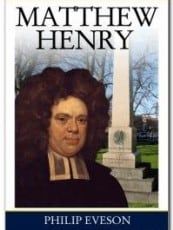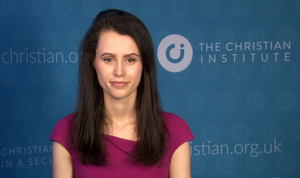Matthew Henry’s evangelism
In this extract from Philip Eveson’s recent biography of Matthew Henry, the author describes Matthew Henry in his outreach to the lost.
 |
| Chester Castle |
Besides the work in his own church, Matthew had been engaged, almost from the beginning, in preaching to the prisoners in Chester castle. It was the jailor’s wife who seems to have been instrumental in bringing this need to the attention of Matthew.
She was a godly lady, deeply concerned about the eternal destiny of those who were incarcerated. For nearly twenty years Matthew faithfully visited the prison and preached to the inmates.
Compassion
He himself was moved by the condition of those so obviously dead in sins and feeling nothing of the awful doom that awaited them beyond this world. He said of such people that their ‘peace is like the sleep of a man in a lethargy: it is not peace — but senselessness and stupidity. They love darkness and sit in it. My heart bleeds for them. Men are destroyed for lack of knowledge’.
In a letter to his wife, who was staying with her parents at the time, Matthew mentions how he had been ‘spending some time this morning with the poor man that is to be hang’d this afternoon. ’Twas a melancholy thing to hear him give orders for the making of his own grave’.
Matthew encouraged these poor wretches to turn to the Lord and know salvation in Christ, using Old and New Testament passages in his messages. He spoke to them about Manasseh’s repentance when he was imprisoned (2 Chronicles 33:12), reminding them that ‘There is a way that seems right to a man, but its end is the way of death’ (Proverbs 14:12).
By warning and pleading from such texts as Proverbs 14:9; Ecclesiastes 9:5; and Leviticus 26:23-24, he encouraged his hearers that their imprisonment could turn out for their good, as Psalm 119:67 indicated: ‘Before I was afflicted I went astray, but now I keep your word’.
He urged them to flee from the wrath to come ‘when the Lord Jesus is revealed from heaven … in flaming fire taking vengeance on those who do not know God, and on those who do not obey the gospel of our Lord Jesus Christ’ (2 Thessalonians 1:7-8).
Other texts Matthew used were taken from Jeremiah 3:21; Luke 12:5; and James 1:15. These evangelistic sermons were brought to a stop by a local Anglican curate, upset that a Nonconformist was engaged in this ministry.
He pressed the governor of the prison to discourage the practice and eventually Matthew’s services were terminated; but not before he preached his last sermon there concerning the penitent thief on the cross from Luke 23:39-43.
Nominal Christians
Matthew Henry’s concern for the lost was not confined to those who seemed beyond hope of reformation. He was likewise grieved at the state of so many who professed Christianity. This was noticeable by the end of the seventeenth century among a growing number with Presbyterian leanings as well as many within the national church.
He writes: ‘There are but few who are truly religious; who believe the report of the gospel, and who are willing to take the pains, and run the hazards of religion. Many make a fair show in the flesh, but few only walk closely with God. Where is he that engageth his heart, or that stirs up himself to take hold of his Maker?’
It was often accepted that if people could say the Lord’s Prayer and the Apostles’ Creed or recite the catechism they were accepted as professing Christians. Matthew was concerned for their true spiritual condition.
While it was common to be troubled, and rightly so, over the condition of the materially poor in society, Matthew was disturbed that there was no similar concern over the spiritually ignorant.
This is how he put it: ‘It is our common complaint that there are so many poor, but who complains that there are so many ignorant, which a man may be, and yet be able, like a parrot, to say his creed and catechism. Those who knew not the way of the Lord, yet said, “the Lord liveth”.’
Matthew’s concerns were those of a former generation of Puritans. His age cared more about reason, morality and science than inner spiritual transformation.
 |
| Bitesize Biography |
Matthew Henry is published by EP Books, in its Bitesize Biography series (ISBN: 9780852347997)
Click here for other Articles concerning Matthew Henry
Matthew Henry also appears on the ET Timeline.




















